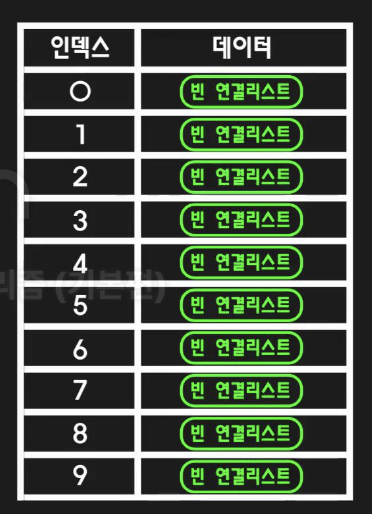자료구조
*이 내용은 인프런 그림으로 쉽게 배우는 자료구조와 알고리즘 (기본편)을 수강하며 정리한 내용입니다.
덱
데이터의 삽입과 제거를 head와 tail 두군데서 자유롭게 할 수 있어.
덱의 추상자료형
printAll - 모든 데이터 출력
addFirst - head에 데이터 삽입
removeFirst - head에서 데이터 제거
addLast - tail에 데이터 삽입
removeLast - tail에서 데이터 제거
isEmpty - 리스트 비었는지 체크
구현
DoublyLinkedList.mjs를 import 해줘.
class Deque{
constructor(){
this.list = new DoublyLinkedList();
}
printAll(){
this.list.printAll();
}
addFirst(data){
this.list.insertAt(0, data);
}
removeFirst(){
return this.list.deleteAt(0);
}
addLast(data){
this.list.insertAt(this.list.count, data);
}
removeLast(){
return this.list.deleteLast();
}
isEmpty(){
return (this.list.count == 0);
}
}해시테이블
해시(Hash), 맵(Map), 해시맵(HashMap), 딕셔너리(Dictionary)라고도 불려.
해시 테이블은 이름에서도 알 수 있듯이 해시와 테이블이 합쳐진 자료구조야.
해시 함수
Key만 알면 Value에 O(1)의 성능으로 읽기가 가능하다!
하지만 동일한 Key에 많은 Value를 집어넣는다면 많은 연결리스트를 뒤져야해.
그러므로 데이터를 골고루 분배하는 것이 중요해!!
장점 : 빠른 데이터 읽기, 삽입, 삭제
단점 : 메모리를 많이 차지함, 좋은 해시 함수의 구현이 필수적!
추상자료형
set - 데이터 삽입
get - 데이터 읽기
remove - 데이터 제거
구현
구현하기 전 hash 함수를 어떻게 만들거냐면~ 위와같은 형식으로 10으로 나눈 나머지의 인덱스에 값을 삽입할거야!
위와같은 형식으로 10으로 나눈 나머지의 인덱스에 값을 삽입할거야!
HashData
class HashData{
constructor(key, value){
this.key = key;
this.value = value;
}
}HashTable
class HashTable{
constructor(){
this.arr = [];
for(let i = 0; i < 10; i++){ // 0~9까지 연결리스트 초기화
this.arr[i] = new DoublyLinkedList();
}
}
hashFunction(number){
return number % 10;
}
set(key, value){
this.arr[this.hashFunction(key)].insertAt(0, new HashData(key, value));
}
get(key){
let currentNode = this.arr[this.hashFunction(key)].head;
while(currentNode != null){
if(currentNode.data.key == key){
return currentNode.data.value;
}
currentNode = currentNode.next;
}
return null;
}
remove(key){
let list = this.arr[this.hashFunction(key)];
let currentNode = list.head;
let deletedIndex = 0;
while(currentNode != null){
if(currentNode.data.key == key){
return list.deleteAt(deletedIndex);
}
currentNode = currentNode.next;
deletedIndex++;
}
return null;
}
}Set
데이터의 중복을 허용하지 않는 자료구조야. 셋은 해시 테이블을 이용해.
해시 테이블의 value 값은 사용하지 않고 key만 사용해서 구현해!!
추상자료형
add(data) - 데이터 삽입
isContain(data) - 데이터 체크
remove(data) - 데이터 제거
clear() - 셋 비우기
isEmpty() - 셋이 비었는지 체크
printAll() - 모든 데이터 출력
구현
class HashSet{
constructor(){
this.hashTable = new HashTable();
}
add(data){
if(this.hashTable.get(data) == null){
this.hashTable.set(data, -1); // value는 쓰이지 않기때문에 그냥 -1값 넣어줌
}
}
isContain(data){
return this.hashTable.get(data) != null;
}
remove(data){
this.hashTable.remove(data);
}
clear(){
for(let i = 0; i < this.hashTable.arr.length; i++){
this.hashTable.arr[i].clear();
}
}
isEmpty(){
let empty = true;
for(let i = 0; i < this.hashTable.arr.length; i++){
if(this.hashTable.arr[i].count > 0){
empty = false;
break;
}
}
return empty;
}
printAll(){
for(let i = 0; i < this.hashTable.arr.length; i++){
let currentNode = this.hashTable.arr[i].head;
while(currentNode != null){
console.log(currentNode.data.key);
currentNode = currentNode.next;
}
}
}
}
참조 : 그림으로 쉽게 배우는 자료구조와 알고리즘 (기본편)
3주차 회고
칭찬하고 싶은 점 : 기한을 지켰다 😅
아쉬웠던 점 : 권장 커리큘럼을 지키지 못했다.
댓글을 작성해보세요.
